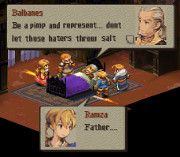|
Countblanc posted:Ok so this is a bit weird, but here me out. Two nights ago I had a dream about a board game which I had apparently designed. It was a worker placement, resource gathering game akin to Stone Age, except it also had rotating role cards like in Citadels. The trick was that the roles functioned both as a boon to the player taking them ("take the Banker to gain an extra two money this turn," or whatever), but also as a sort of meta-guessing game. Part of what you're describing is in Witch's Brew, a game I adore. There are 12 different roles each with a "big" benefit that pays off at the end of the round and "small" benefit that pays out immediately. Each round every player selects 6 of them in secret. Then, starting player reveals one role and must choose the "big" benefit, then passes to the next player. If that player has the same role, they must show it and have two choices: A) "Steal" the role, and the player before him loses all benefit from the card. B) "Defer", where they take a smaller payoff, but the first player keeps the "big" benefit. Play goes around all players like this, and whoever still owns the "big" benefit at the end of the round earns it. I's always a guessing game; should I steal the big benefit but risk somebody else stealing it from me? Additionally, if you can figure out what other players will be playing, you can try to take roles the other players aren't and get a huge payout for the round. It's a really fun mechanic.
|
|
|
|

|
| # ? Apr 27, 2024 17:05 |
|
That does sound like a neat mechanic, and not quite like anything I've seen before. I'll have to try to find a chance to try that game.
|
|
|
|
Alright, so I am working on a game about Republican Rome and I have an idea for a basic mechanic that I wanted to sound out with you guys. The game is competitive but there is also some call to cooperatively work together (think Archipelago). Apologies for the long post... So, the basic idea is that in your hand are a number of legislation cards. Passing these are the main way to get victory points (they also affect the game state increasing the food available, allocating military, making trade agreements, etc). Each legislation card is associated with one of the three factions in the game -- the optimates (aristocrats), the populares (demogogues), or equestrian (mercantile). In order for the card to be passed and to get points, you need to persuade senators of the same faction to vote for them. In the center of the board there are a number of senator cards. Underneath each senator card, with the top showing, is a two sided loyalty card. The front side identifies the apparent faction (optimate, popular, equestrian) and the back identifies the true faction as well as the senator's voting power (a number, say 1-5). The front and back of the loyalty cards normally match (say 70% of the time) but they can also be 'trap' cards or cards of differing allegiance. So, when a player proposes a piece of legislation (that is the basic action in a turn) he picks a senator from the center to introduce the legislation and another player picks a senator to run in opposition. Both loyalty cards are flipped over and their strengths are compared -- any loyalty card revealed (hidden under either senator) that matches the association of the piece of legislation (so 'popular' loyalty card matching a piece of 'popular' legislation) adds its strength to the total. Any loyalty cards of a differing allegiance (again, hidden under either senator) subtract from the total. If the total strength is positive, then the legislation is passed. If either player reveals a 'trap' card, then they suffer the effects of that trap. Instead of proposing a piece of legislation, a player can discard a card (so long as it is not a trap card) to look at the loyalty card of a senator. Once all cards are used up, the round is over -- if any trap cards remain, they take effect against the player holding them. Now, here is where it gets a bit tricky. Loyalty cards and the legislation cards are the same (the legislation and result are listed in the center of loyalty cards), so the player's hand of legislation cards is simultaneously a hand of loyalty cards -- that may mean that they also have 'trap' cards in their hand (which cause negative points if you cannot get rid of them before the end of a round). That further means each player can see see what 'allegiance' all of the cards in another player's hands are. Those loyalty cards which have strong voting power if placed under a senator are also worth the most victory points if passed. Once the senator's loyalty is exposed, both players must pick another player at the table (this can be the same person). This person takes the revealed loyalty card and places it face down in front of them (so that the apparent allegiance is showing, regardless of the actual allegiance of the card). If they have a card in their hand that matches the apparent allegiance they take that card out of their hand and place it on top of the loyalty card. Both cards are then taken under the table (face down). The player then discards one of the cards (without looking) and returns the other, face down, under the senator. He then draws a new card. Alternately, if the player does not want to discard the card from his hand, he can take the first card from the draw deck which matches the apparent faction allegiance (again, remember that these are printed on the back of the card) and, without looking at it, follows the above procedure (deciding whether or not to slip the card he knows about back under or a random one). If the player does not have a card which matches the apparent allegiance of the loyalty card, he can place any card from his hand under the senator (which will be a different apparent allegiance) OR substitute the top card of the draw deck. Of course, the card substitution phase is the best place to sneak traps under a senator. Once a senator has been used once for voting, they cannot be used again that round. Now, I am picturing this game as requiring cooperation and deal making outside of this mechanic (so a person's desire to help/screw someone else is not totally tied to this) but what are your thoughts on how it would run? Any games that share the mechanic? Too complicated?
|
|
|
|
The mechanic sounds good, but there's a physical problem with two-sided cards if players are holding them in their hand, which is that one side is always going to be visible to the other players. Is everyone supposed to know the apparent loyalty of unplayed cards in others' hands? If that's the case, I guess it's fine, but remember to indicate apparent allegiance on the actual-allegiance side as well (by an icon in the corner or whatever) so that players don't have to go through physical contortions to see what apparent allegiance their cards have without accidentally exposing their actual allegiance to others.
|
|
|
|
Richard Garfield gave an interesting little talk about Luck in Games. I had no idea he wrote a textbook about it too. http://www.youtube.com/watch?feature=player_embedded&v=av5Hf7uOu-o
|
|
|
|
quote:Richard Garfield gave an interesting little talk about Luck in Games. I had no idea he wrote a textbook about it too. I'm a big fan of Garfield and his approach to design, but I will say I was a bit disappointed by the textbook (Characteristics of Games). Part of the problem is that he does such a good job explaining his ideas in his various lectures, podcasts (the Three Donkeys podcasts are really strong), etc... that for me the book felt like a retread. I was also disappointed in that he didn't attempt some grand unifying theory of skill/luck - I was hoping for, perhaps, mathematical tools or approaches by which we might tease out some solid numbers for these things. Still, he is bloody great.
|
|
|
|
So today I started emailing people about my newest finished game, and I already have two people asking for prototypes! Eeeee Almost a year since I started making games, this is about as far as I've gotten beside that one thing with my last game that just fizzled out.
|
|
|
|
I've been riding the magic dragon of designing games in my off time and such. I've even made a prototype with glue sticks and cardboard recently (So proud of myself.) I've had a question I can't really ask anyone, so I was hoping a few people could take a crack at it and help me mull it over. The question has to do with the complexity of a game, and what makes a game fun. I've been looking at the games I've had in documents, but keep asking myself why I stop short of developing the mechanics and moving into play testing. Because I have a problem with scope, a game sounds promising and has a core idea with tried and true mechanics instead of just being a boatload of promises (starting with a mechanic instead of a theme or story.) Then I throw the game out because it becomes too complex and the mass of ideas fall in on themselves proving impossible to find what the game I actually wanted was, or the game fizzles because I just don't want to go too far with it and burden it with a bunch of crap bookkeeping, but it just seems so simple I don't think it's any fun. So here is the question, since everyone totally took the time to read the back story of why I can't stop tripping over my own shoelaces, what is fun about a game? Are simple games fun because its easy to learn and pick them up? meaning you typically have less setup/cleanup and all around can resolve the game? So are games dependent on being appropriately fun for the amount of time and effort you spend playing them? Are long games fun because the drawn out encounters build tension, and have meaningful decision that will effect the outcome of the game? A game that is long and simple would typically be able to be reduced to the point that the game is determined very early on, or is too random that everything is up in the air until the last second. I'd ask some of the people I know, but I really don't have very many board game playing people around me at all. If you don't want to bog down the thread cause you have a couple pages to write, feel free to shoot me an email (metadustatgmaildotcom), it would mean a lot as these are the questions I need answered so I can get through some creative blockage. Inspiration and research only goes so far for getting me through some play testing and writing sessions. TL:DR Send your opinions to the email mentioned above answering me this; (A: Why are simple games fun?) (B: Why are complex games fun?) edit: As soon as I come in here, I am all over that Richard Garfield video, this is some great stuff. PROTOSTORM!!! fucked around with this message at 13:03 on Sep 19, 2013 |
|
|
|
Protostorm, I think there's as many answers as there are players to the fundamental question of what makes a game fun. Some players love politics, some love bidding or bluffing or completely open games of head-to-head strategy. That's even ignoring the life situation aspect: while I adore evening-long bigass boardgames like Twilight Imperium, neither I nor my boardgaming buddies are really able/willing to invest the time to play them anymore. Anyway, I'll just answer from my perspective: - I always want to feel like I can have a meaningful impact on the gamestate. Nothing feels worse than being clearly irrelevant to the game before it's over. - I loathe politics/kingmaking because I feel it takes away from the mechanical game to just become That Wheedling/Sneaking Game - Flavour is at least as important as mechanics to me. It's a huge difference whether I'm rolling a D6 to destroy a skeleton vs. rolling to see how many wooden cubes I am allowed to place on my score track. - I don't mind complexity as long as it's well-placed and fits the flavour/goal of the game. As an example, the WoW boardgame (original edition) is pretty fiddly, but it manages to capture the differences between the classes really well, which I think is the main draw of that particular game for me. Simplicity doesn't really enter into it as much as elegance/fittingness if that makes sense. - Player elimination is a terrible idea unless the game only lasts 15 minutes guaranteed.
|
|
|
|
|
My favourite theory is that what makes a game mechanically (that is, disregarding theme) good is the frequency of interesting decisions. Where an interesting decision, to quote Sid Meier, is one where the player feels is relevant to the game as a whole, and the player feels that he has enough information to make it intelligently. If you look at some of the better euros, nearly every decision a player makes is Interesting under these criteria. It is rare to be able to do exactly what you wanted to - so decisions are meaningful and not automatic - but you can usually figure out which option is the lesser of two evils - so you can make it intelligently.
|
|
|
|
To borrow/mutate/Frankenstein the two answers above me, the draw of playing board games is playing them. I know that sounds idiotic and obvious, but figure out reasonswhy people would want to play your game, figure out a way to make those things happen as often as possible. Whether that be meaningful strategic decisions in a Euro, cool stories of experiences from a thematic Ameritrash, or laughing because your friends made really offensive jokes in a party game.
|
|
|
|
I've been working seriously on a board game with a friend of mine for about eight months now, and we've come to a rather annoying problem regarding game pieces. It seems to us that board games with miniatures/figurines are more desirable and do better on Kickstarter, where we hope to get funding. The problem is that manufacturing and including minis in the game is prohibitively expensive. We're already looking at an MSRP of $60, and minis would likely push that to $90-100, which would be a really tough sell to retailers. So, the questions are: -Are minis as valuable/necessary to succeed at Kickstarter as they appear? -What's the best/cheapest option for manufacturing minis? -If we offer minis separately as a Kickstarter reward, what's the best/cheapest way to do a limited run of them?
|
|
|
|
So for the past 6 months I've been working as a Social Media consultanty thing manager guy for a couple people on the forums. This past month I kinda accidentally ended up doing it for some Kickstarter and indie board game people, and I thought, what the hell. http://sandypuggames.com/?p=909 If this is too self whorey, I'll remove the link an junk. Basically I'm offering some really extensive and in depth social media training and management stuff for insanely cheap, for anyone who doesn't really know it themselves. Figured maybe one or two of you guys might find it useful. CirclMastr posted:I've been working seriously on a board game with a friend of mine for about eight months now, and we've come to a rather annoying problem regarding game pieces. It seems to us that board games with miniatures/figurines are more desirable and do better on Kickstarter, where we hope to get funding. The problem is that manufacturing and including minis in the game is prohibitively expensive. We're already looking at an MSRP of $60, and minis would likely push that to $90-100, which would be a really tough sell to retailers. So, the questions are: Minis are always a pain in the rear end, which is why you very very rarely see them involved in a KS. Getting custom ones manufactured is just out of the realms of viability for mostly everyone who doesn't already have backing or deals with manufacturers. I'd suggest going with your third option, offering proper minis for a (high) KS reward tier. A lot of Big Games are $80-90 these days so I don't know if it's going to be that bad of a sell to retailers. Someone with more experience printing professionally should chime in here though. Which manufacturers have you been looking at? What's your current plan re custom minis? edit; This VVVVV Nemesis Of Moles fucked around with this message at 19:16 on Sep 20, 2013 |
|
|
|
I see a lot of games make their goal with good art and cubes. I think good art is more important. I'd price it out and make it a stretch goal, but only if the stretch totally covers the costs. If there's one thing I've noticed in KS post-mortems it's "holy poo poo those miniatures cost way more than I thought and almost bankrupted me". Well, that and shipping. </anecdotal>
|
|
|
|
Both for PROTOSTORM who has trouble finishing what he starts, and CirclMaster who's thinking of Kickstarting a game with a $60+ MSRP and furthermore considering adding custom minis to it... I cannot stress enough how important it is to scale back your ambition when you're starting out in this field. You're setting yourself up for disappointment if you bite off more than you can chew, and more importantly in CirclMaster's case, you're not really being fair if you're attempting something ambitious with other people's money when you have no prior experience. Seriously, guys, make a little card game, or a dice game or at most something of the scale of, say, Glen More. If you're going to try a Kickstarter, try to make it something you can produce with a funding target under $10,000, so that there's a limit to how far wrong you can go, and so that if you do cock things up royally, you can repay your backers without ruining yourself.
|
|
|
|
Yeah - I don't usually feel bad for failed Kickstarters, but sometimes I cringe at successful ones that have bitten off a lot. Like these guys making what's now called "Leaders: the Powered Board Game" (I've been following this one for a while; I find it fascinating even though I have no interest in the game). They have $8000 to deliver a custom board, minis for soldiers and tanks and aircraft, custom dice, a ton of art, and some random backer bonuses (handfuls of T-shirts and tablet covers). Oh, and a complicated tablet app for Android and iOS. For their initial batch, they have to make ~70 copies of the physical game. 70 is a huge load to kludge together manually, but too few to really mass produce. I have no idea how I'd go about making 70 copies of a board game other than that it would be costly or painful. Maybe it'll all work out for them somehow, but if this is all they do with the game then they're going to be doing hundreds of hours of work for negative money. Meanwhile, these guys made a game that's just cards in a box. And the cards are just centered text on white backgrounds. Maybe they won't make their $15,000 goal, but if so then they haven't lost that much effort. And if they are successful, they'll likely be making a reasonable profit on each unit. Again, I'm not interested in the game, but these people have set themselves up for either success or painless failure. I understand people get satisfaction out of running a project and having people buy it, but that satisfaction surely can't be worth the pain that many of these projects are signing up for. jmzero fucked around with this message at 21:33 on Sep 20, 2013 |
|
|
|
Nemesis Of Moles posted:Minis are always a pain in the rear end, which is why you very very rarely see them involved in a KS. Getting custom ones manufactured is just out of the realms of viability for mostly everyone who doesn't already have backing or deals with manufacturers. I'd suggest going with your third option, offering proper minis for a (high) KS reward tier. A lot of Big Games are $80-90 these days so I don't know if it's going to be that bad of a sell to retailers. Someone with more experience printing professionally should chime in here though. Which manufacturers have you been looking at? What's your current plan re custom minis? The problem with an $80-90 game is that, according to a lot of the retailers as well as our distributor, $90 games sit on the shelf a long time between buyers. Stores stock one or two copies, and when it sells, they restock one or two more. Meanwhile, games in the $55-65 range sell through more quickly and are more likely to be bought on impulse by a regular or group of players looking for a new game. So we decided to target that $59.95 sweet spot, which means we need our cost of goods sold to be $10/unit at most. xopods posted:Both for PROTOSTORM who has trouble finishing what he starts, and CirclMaster who's thinking of Kickstarting a game with a $60+ MSRP and furthermore considering adding custom minis to it... Yes, I will readily admit that this is the first game I've ever worked on, but that's not true in my partner's case. I will take this advice, however, and present it to him. Frankly, he's much more the creative side and I'm much more the business side. Working on this project with him has given me a concept for a card game much like you're describing, though. I doubt he'd be willing to put the current project aside to do a card game first, considering how much work has and is being done, but I'll see what I can do. Some follow up questions: -So far the manufacturer we're looking at is Grand Prix International, and we have a soft agreement with Alliance Games for distribution. Are these decent/reliable organizations to work with, or should we be looking elsewhere? -What should the Kickstarter goal be for a large project like this? I'm of the strong opinion that we should ask for as much as we need ($125-150k). However, numerous people have told me that a large goal will deter backers and instead we should ask for $25-35k so that it can be met more quickly, because a fully-funded project will attract more backers "buying into a sure thing" (and if we don't get the actual amount we need, simply refund all the money back). What's the correct approach?
|
|
|
|
CirclMastr posted:-So far the manufacturer we're looking at is Grand Prix International, and we have a soft agreement with Alliance Games for distribution. Are these decent/reliable organizations to work with, or should we be looking elsewhere? Unfortunately, I can't tell you much about this, as I don't self-publish. I can tell you that as far as distributors go, you're probably best off going with one that's close in scale to your own operation rather than the biggest one you can get. That's a mistake my publisher made with our early games. The thing about being a small publisher working with a big distributor is that they'll never give your game the same attention that they do their other games with runs 10 or 100 times larger, so my publisher now says his philosophy is to work with someone closer to your own size and try to grow together, which makes sense to me. quote:-What should the Kickstarter goal be for a large project like this? I'm of the strong opinion that we should ask for as much as we need ($125-150k). However, numerous people have told me that a large goal will deter backers and instead we should ask for $25-35k so that it can be met more quickly, because a fully-funded project will attract more backers "buying into a sure thing" (and if we don't get the actual amount we need, simply refund all the money back). What's the correct approach? I don't have any experience kickstarting, but I'd say that you want to cover at the very least the manufacturing and shipping costs for your first run, so that even if your distributor bails and you never sell a single copy outside of Kickstarter, you're at least not losing money. So if your game has a $60 MSRP and a $10/unit manufacturing cost, and you're planning on doing a typical first run of 5000 copies, you want to get about 800-850 copies "sold" as Kickstarter rewards to raise the $50,000 you need for printing. Any stretch money you get on KS and any copies you sell normally after you've fulfilled the rewards would then be cream. I would certainly not set a goal lower than what you need to move forward with the project. If you give everyone their money back, you won't get sued, but you'll generate a lot of bad feelings if it comes out that you never intended to go forward with the project unless you got some amount higher than what you were asking. Don't lie to people. Also note that KS takes a rather substantial cut of the money if you do get funded, so if you end up reimbursing everyone, you'll be paying that portion of the money back out of your own pocket.
|
|
|
|
Alliance is a great distributor to have because almost every game store has an account with them. I see a lot of games online and at cons that I would love to carry in our store (which is Card Kingdom in Seattle, a pretty well known landmark game store) but can't because they either use a very small distributor or only allow stores to order direct. There's something to be said for being overly ambitious, but to be honest its hard to extend the reach of your product or brand if parties that become interested can't buy it. In other news I did the first play test of my Guildmaster game and found out that there are problems, some extending to the base assumptions I made with the game, but that buried under those problems is a very fun game worth making, which is a good place to be.
|
|
|
|
Okay, but you're looking at it from the point of view of a store owner. From a game publisher's perspective, you're relying on your distributor to market the game to store owners, not just wait for them to come to you with an order. While your point about accessibility for store owners is well taken, it doesn't much matter if every store in the country could order your game, if none of them have any idea it exists. That said, if you're doing a Kickstarter, you may generate enough buzz that way that it doesn't matter if your distributor isn't doing anything for you except taking money and sending games.
|
|
|
|
xopods posted:Okay, but you're looking at it from the point of view of a store owner. From a game publisher's perspective, you're relying on your distributor to market the game to store owners, not just wait for them to come to you with an order. While your point about accessibility for store owners is well taken, it doesn't much matter if every store in the country could order your game, if none of them have any idea it exists. Having a distributor with reach like Alliance, ACD, or GTS is not the only piece of the pie obviously, but its a necessary piece to having your games be successful. The other part is generating buzz for your game. The difference is that if you have a great game and are doing well generating buzz but do not have a good distributor you can't go any farther at all(unless you are Cards Against Humanity apparently). The other way you could at least luck into some buzz for your game and have the distribution to back it up. I am looking at it from the point of view of somebody who regularly talks to publishers, distributors, and designers. There were a handful of really cool products I wanted us to carry that I found at Gen Con this year but I can't because they don't do distribution.
|
|
|
|
On further thought, what you're saying is probably 100% true for the U.S. market. It may be different if you're selling mostly in Europe as we are. We still go with Asmodee for the U.S., but we also sell very little there.
xopods fucked around with this message at 11:56 on Sep 23, 2013 |
|
|
|
I've been trying to figure out the rules for a worker placement kind of game which is sort of Sim Hotel meets Agricola before putting together a prototype. The aim of the game is to try and build up your hotel to attract customers (who will only move in if you have certain facilities or attractions, eg a pool, a gym and so on) and also to make a "nice" hotel. In other words, you score points for having customers and points for your different facilities, with bigger facilities scoring more points but taking up more space on your board so you can have less altogether. The main things I would like to try are to have a very basic "shared board", which would be more or less some squares which each let you gain a different type of resource, and then a build square. The facilities which you are building to attract customers also become extra action squares, which anyone can use - they might let you trade resources. So for example, you are the first player and you want to attract a customer who is a fitness freak to your hotel. He won't move in unless you build a gym. However, if you do build a gym then someone else can use that as a square to claim the first player position (because they work out and get faster, obvs). Conversely, you might spot that a player has built an IT room which would allow them to trade the resources they have for the ones they clearly need (by selling and buying on ebay, again obvs). You don't really need to trade resources, but you can tell they're desperate for that spot as they built it when there are no relevant customers on the board. So you go in there and block them, just like any other worker game I guess. Now, the only worker placement game I've played is Agricola. My question is, has this sort of mechanic been in another game, and does it work? The other sticking point is that I'm not sure how, or even whether, players can gain extra workers. Presumably this would be done by building the relevant room, as in the other examples, but I'm not sure how I could thematically place an upper limit on the number you can have. Either of the ways Agricola does it (number of rooms or increased need for food) I can't really see working at the moment. The other thing is that I'm going to try using Lego for all the components, so having a bunch of different pieces will hopefully not be a problem.
|
|
|
|
I don't have the broadest game experience, so there are probable better examples, but if you're looking for mechanics on how to include what other players have built, you could probably draw ideas from Archipelago and Quarantine. In Archipelago, indirectly stealing other players' buildings is a fairly important strategy, and it also offers numerous shared boards so you can get a feel for how that kind of interaction plays out. Quarantine offers mechanics that are almost the exact opposite of what you're describing: feeding the other players more than they can handle with their room set-ups, and also disabling their rooms by feeding them infections. So it's not just a matter of blocking, but of over-feeding them (which they can try to turn into an advantage). Tippis fucked around with this message at 23:30 on Oct 3, 2013 |
|
|
|
Archipelago is really high on my to-buy list, so I might have to pick it up sooner rather than later, thanks.
|
|
|
|
Puerto Rico is worth a look for this sort of mechanic, too. Its mechanic isn't exactly worker replacement, but it has some similarities you might want to look at.
|
|
|
|
I don't know of any game that works quite like that, but you might also want to look at Dungeon Petz as a worker placement game in which you're using your actions to meet varying needs (it's actually a two-tiered thing in Dungeon Petz, as you're trying to raise pets to satisfy the demands of specific customers and competitions, but the pets themselves have needs that you need to deal with). As for the mechanic of facilities opening up new action spaces for other players, there are three things I'd say for that: (1) Make sure that the game functions more or less without any of the extra action spaces, since you will occasionally have games where some facility or other is never built... so e.g. unless there is another way for the start player marker to move around, the "Become First Player" space should be one of the permanent ones, not part of a facility. (2) People are going to feel like it should make a difference who builds a given facility... either there should be a cost in using someone else's action spaces, or some benefit in having other people use yours. Perhaps each space has a major and minor effect and the person who places the worker gets the major effect while the space owner gets the minor effect. Or maybe you have to transfer a guest from your hotel to someone else's in order to use their facility, which makes thematic sense. (3) You're going to need a plan to deal with the expanding number of available spaces as the game goes on. E.g. in Agricola, there's Family Growth, but also the later spaces are generally better than the initially-available ones, so there's still competition for desirable spots in the late game. In your game, since several players may potentially build the same facilities, you could end up with a lot of duplicate spots and not many workers, giving players too many options and not enough blocking potential in the late game.
|
|
|
|
I'm working on some rule changes to deal with some problems in Archipelago. If anybody has played it, I'd like to hear some feedback. I'll start with the problems (perceived or real) that seem to happen when we play
Distributing Objectives When trend and objective cards would normally be distributed, do this instead. Separate the objective cards into 3 shuffled piles, Secret only, Public only and all else. Take one all else card for each player, and add the secret only objectives. Shuffle these and give one to each player. Set the rest aside without looking at them. (Tune so that more than half of games have one of Pacifist and Separatist) Take the rest of the all else cards and shuffle in the public only cards. Set out one for each player face up. Place three end game condition cards face up as well. (Could draw more during game, or pass some/all our as secret end game conditions) Scoring Objectives Public objectives are worth 3 points for first, 2 points for second, 1 point for third, zero points otherwise. Secret objectives that could also be public objectives are worth 2 points for the player holding them if and only if they are first in that condition. No other player scores points for a secret objective. Deciding turn order When bidding for turn order, players who lose the bid (including those who lose ties) get half of their money back, rounded in their favor. Exploration Phyrric Exploration - When you would fail an exploration action, instead continue drawing tiles one at at a time until you find a playable tile. If both sides are playable, you must play the first revealed side. You gain one less (or no?) resources from this exploration. Possibly limited to once per game? Not included here, but I'm planning to rewrite all the objectives and end conditions to make them easier to use separately. Mostly they will consist of the same things as the base game, like having the most of a resource. modig fucked around with this message at 20:33 on Oct 14, 2013 |
|
|
|
modig posted:I'm working on some rule changes to deal with some problems in [a]Archipelago[/b]. If anybody has played it, I'd like to hear some feedback. After a few fairly comprehensive plays, I agree with most of your problems and am quite interested to hear how your solutions work out. Losing an action after exploration is devastating, especially in the early game. At the same time, I wonder whether or not your proposed variant makes exploration too good by removing the only significant risk. Since exploration gives an almost a guaranteed 2 resources (1 exploration token and 1 from the tile) for the cost of one worker's action and a single action disk, by removing the risk, I fear (without any real data to back it up) that you have made the option too attractive -- to the extent that it might outweigh the potential gains of the other spaces. This problem is compounded by cards that allow double explorations, etc. As you suggest, I think limiting the 'automatic success' to once per game would be a good compromise (although I am not sure that it fixes the bigger problem -- because some positions are just not setup to explore easily). Still, if you try it out, I would love to hear how it goes. As a simpler option, it would perhaps be enough of a band aid to give players an exploration token regardless of the success or failure of their exploration. That limits the devastation while still making a failed exploration sting. The only potential balance problem that I see with this is potentially negative interaction with end game conditions that rely on the amount of exploration tokens (although, at a glance, I don't think that it would change that too much -- although it would probably stop the strategy of 'boxing in' a player who is trying to end the game by exploring). The secret objectives problem is a big one -- for us the problem is compounded by that fact that since the game length is also controlled by the secret objectives, it can be very difficult to get even a general sense of how far away you are from the end of the game (which makes game endings terribly abrupt). I like your outlined method of trying to fix the problem and am interested to see how it turns out (be sure and report back) but, as above, I wonder if you aren't trying to change the base game too much -- and it is always difficult to predict how changing the method of scoring (especially making the private objectives score only for the player who possesses it) will affect the balance of a fairly closely scored game. As a simpler option, I have been toying around with the idea of just revealing all of the secret objectives at the beginning of the game (so, deal out one per player to the center plus one/two extra). Once everyone has had a chance to look at them, shuffle the cards and distribute one to each player -- with one/two left over. This way, players can be pretty sure what MOST of the conditions for victory or game end are without being absolutely certain. My hope is that this would also allow players to score off of those objectives that you wouldn't score on just by playing normally. The biggest potential problem is that this would make the role of the pacifist or separatist much more obvious, although I find that in practice their actions are already pretty obvious (since there is no accusation mechanic, it isn't even that detrimental for the separatist to immediately start trying to openly tank the rebellion meter). Regarding the bidding, I have noticed pretty much the same pattern BUT it hasn't ever bothered us. Given that there tends to be a heated secondary (and open) market of people trying to bribe the first place player to make them second place, it mitigates the sting of losing a large bid. It also makes rounds where everyone bids heavily (thinking that everyone else is going to bet 0) but loses their money, pretty hilarious. With that being said, I can only see one problem with your prospective change -- that is, it might encourage (even more than before) betting basically all your money -- because now there is a safety net if you lose. In any system where there is no room for second place, I think that it is always going to be 'bet big or bet nothing' but this might at least encourage a little more variability in the betting. The only way to tell whether or not my gut is right on this one would be to playtest it a couple of times though.
|
|
|
|
I'm toying around with what started as a re-skin of Space Alert. The idea is to use as much as possible from Space Alert, but in a kitchen setting. Something along the lines of: you get orders to fulfill, and have to first go chop some vegetables (one action, some cubes move around), then put it in a pot (another action), then wait for three turns while it boils, then it's done. About that scale for the actions – stuff one person does for a while in a kitchen, like minding a pot or washing the dishes. A turn would probably represent 5 or 10 minutes. So I've been thinking about what makes Space Alert good, what makes it a good co-op game, what stuff I can keep, and how to replace that which I can't keep. Feel free to pitch in. First off, stuff we all know but bears re-stating: Space Alert is a good co-op game because it limits both planning and communication by limiting time. For comparison I recently got Space Cadets, and I really like it as well but only after one big modification: completely outlaw all game-relevant communication whenever you're not timed. And it's relevant that it's not only communication that's timed, too. In Space Alert, I've come to the point where I actually can quarterback new players pretty effectively, but since them carrying out those orders are also timed they aren't bored from it. The moment I see that they don't need all the time just to find the right cards and move their piece, I scale it up by asking them "go to lower blue and fire!" instead of "I need you to place blue, down, A, in that order!". Most new players pick up pretty quickly and never go through a phase where they're not interested or contributing. Okay, given the core of "timed soundtrack tells you stuff, plan out several (all) actions simultaneously then reveal", what's next? I've been thinking about whether the 2x3 board, the four types of actions, what they represent and w/e is essential. One piece that I think is very important is the fact that you are always exchangeable. Another player who stood in your space making the same actions has the exact same effect. Oddly, the fact that you don't have to commit too hard when planning drastically increases depth and reduces the feeling that "yep, we solved that one, we found the one solution". If you realise one more thing you could do over in blue zone before you leave, you can yell "hey green player, can you do my job in white zone rounds 4 through 7? I'm shooting twice and then charging the shield". That's really fun when it happens, and it keeps the possibility space large (since five different players can do each of four actions in six rooms each turn) yet manageable (since "I press A in round 2" and "you press A in round 2" are equal in many (but not all) respects). So I want to keep the few, clearly-defined actions that don't depend on special cards that only you have. Your B action is the same as my B action. Then again, it's genius in Space Alert how people immediately spread out and suddenly "you are our ONLY HOPE because ONLY YOU can wiggle the computer mouse in time". This is because of the map and movement, and even if it doesn't really jive with the theme (the kitchen is so big that moving around is on the same timescale as peeling a sack of potatoes?) I think moving around is the best way to do it. Alternatives would be, maybe, some other sort of state that different players could be in ("Okay, I have the apron so it'll have to be me making the dough. You've got the oven mitts, you can't wash dishes!"). Another thing that seems like a conscious design decision about Space Alert is the fact that the resolution round goes without any decisions. This might seem obvious but when thinking about where and how to modify the game it's incredibly easy to come up with ideas that would require something to done during the resolution step. Or rather, stuff that's hard or just messy to track so that the pieces can be moved around during the timed part, reset, and still retain all their information. Space Alert has the following information-bearing stuff going on: – positions of 13 pieces on the board - positions of a bunch of cubes (almost exclusively the same colour, representing the same things) on the board - positions of threat cards (out of four different trajectories) - cardboard markers denoting the number of each threat, placed on the right trajectory - some assorted cubes on the threat cards - the action cards, placed on the action tracks None of the cubes or markers are really placed with any precision; the greatest one is the threat markers moving along the trajectories. This is something I'm toying with right now – how much information can I trust to stay non-shuffled on the threat cards – can I have two separate areas to place damage cubes in? Three? A little grid to fill in with cubes? Of course these answers aren't absolute, but there's something to be said for Space Alert's robustness: I can just fling three damage cubes onto the threat cards in the heat of the moment, and three minutes later someone else can look at it and deduce that it's damaged but not dead yet (even though of course you ask people to clarify and stuff). There's a risk of introducing trouble by requiring more precise cube placement. For the Kitchen Alert game, I'm planning on allowing myself theft, making it a re-skin, to the degree where it could never be sold (just so you know where I'm aiming). If it feels like it fits, I'd love to be able to re-use the action deck, for example. But right now I'm not at all sure about what to keep and not. Does anyone else have opinions on what's good or bad about Space Alert? If you were doing a re-skin or a hack of it, what would you definitely keep? What would you make sure to replace since it builds too heavily on the space exploration theme? Tiger fucked around with this message at 18:22 on Oct 14, 2013 |
|
|
|
Thanks for the thoughts. I'm glad to hear (or maybe not glad, but at least it means I'm not crazy) that you've seen similar problems. A group can get stuck playing a game a certain way, either missing a rule or a key strategy, and just not see it right, so it sounds like I wasn't doing that. I did realize that we haven't been using the ability of the exploration tokens to act as any resource. So early you should never have to have all your guys rebel during a domestic crisis, because you start with an exploration token. With the exploration, I was trying to come up with the right punishment. I listed getting fewer resources, which I think is a pretty good choice, since one of the main reasons I explore early is to get resources. You pointed out that the exploration tokens are tied up in victory and scoring conditions. Also they match the number of tiles, so I didn't want to mess with them. Actually you could remove the exploration token from the pile and not give it to the player. This would still let someone bumrush an exploration end game condition, which is something I just thought of, which makes once per game seem like a good idea still. Also maybe it could engage the unit that explores? Any ideas on how to limit it to once a game or similar using existing mechanics? With the secret objectives I went with only scoring for yourself because I didn't want people studying the possible objectives. However, my plan was also to simplify the objectives (so there are no building X with resource Y) once, so it should be easy to guess if something could be an objective. If some player seems to be hoarding fish, maybe their objective is fish and I should hoard some too. If some playtests show this to be a problem I could go back to 3/2/1 or 2/1. I actually kind of liked the fact that Archipelago felt aimless for a while, so I could have the public objectives be revealed over the first few turns. For bidding... I can see where you are coming from. This is definitely the smallest of the problems I listed. We actually did play a few rounds with the modified bidding rule, and it went fine. I think typical bids were a bit closer, and the winning bid may have been a bit lower than it would have been. It is also totally separate, so it could be an optional rule. I think the secret objectives is the main problem to fix, as in I don't think I can get people to play it without fixing this. The other two are just sort of trying to make the game a bit less harsh, and I think aren't necessary. I also feel, especially after reading your post and replying, that that are a ridiculous number of choices I can make, and I just sort of need to pick something and try it. edit: This is what I'm going to playtest, packaged as a nice print and play pdf. modig fucked around with this message at 01:41 on Oct 15, 2013 |
|
|
|
Is there a good site for making 1" circles or hexes that are the same physical qualities as poker chips? Basically what I'm looking for here is something I could stack easily underneath a model that could be identified from the side based on color or something like that.
|
|
|
|
Alea Tools. They're even magnetic. http://www.aleatools.com/Default.asp
|
|
|
|
Awesome, this is pretty much exactly what I was looking for
|
|
|
|
This may not be the best thread for it, but I posted earlier how I want to fund a game via Kickstarter. My business partner and I have a smaller card game that we're going to do first, about the middle of November. What would be the best way to go about marketing the Kickstarter to make sure it succeeds?
|
|
|
|
quote:What would be the best way to go about marketing the Kickstarter to make sure it succeeds? Do make sure to post on the "Trad Game Kickstarters" thread here; it gets a fair amount of traffic, and generates a lot of purchases; there's always people looking for good games and are more inclined to support a goon. If you just want to spend naked ad money, BoardGameGeek is probably not a bad idea. I've heard good things from Kickstarter runners about response from BGG ads. And pay attention to little stuff - your project icon thingee is very important as is your name and brief description; many people browse places like KickTraq where that's the only thing they'll see.
|
|
|
|
CirclMastr posted:This may not be the best thread for it, but I posted earlier how I want to fund a game via Kickstarter. My business partner and I have a smaller card game that we're going to do first, about the middle of November. What would be the best way to go about marketing the Kickstarter to make sure it succeeds? You probably have already seen this (and it is focused more on the actual 'Kickstarter' phase rather than the pre-marketing) but the guys who did Viticulture and Euphoria have put together an exhaustive step-by-step examination of their experiences with Kickstarter. I have no idea how applicable the advice is, given that funding a small card game is different than a large designer boardgame, but it is probably worth a read at StoneMaier Games.
|
|
|
|
Hey xopods, I vaguely remember reading somewhere that publishers really, really prefer games that have a total of 55 or 60 (or a multiple of these), since that's how everyone prints anyway. Is that true, or am I misremembering something?
|
|
|
|
Lichtenstein posted:Hey xopods, That's what I've heard from various people. 55 cards (which comes from 52 cards, 2 jokers, and 1 bridge scoring card as the default in a deck of cards).
|
|
|
|

|
| # ? Apr 27, 2024 17:05 |
|
signalnoise posted:Is there a good site for making 1" circles or hexes that are the same physical qualities as poker chips? Basically what I'm looking for here is something I could stack easily underneath a model that could be identified from the side based on color or something like that. Alea is solid. Alternatively, Litko is my source for all things plastic and marker-like; they've got a "custom marker" ordering page that's pretty reasonable as well.
|
|
|































